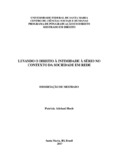| dc.creator | Hoch, Patrícia Adriani | |
| dc.date.accessioned | 2019-10-07T20:29:15Z | |
| dc.date.available | 2019-10-07T20:29:15Z | |
| dc.date.issued | 2017-02-22 | |
| dc.identifier.uri | http://repositorio.ufsm.br/handle/1/18497 | |
| dc.description.abstract | The right to intimacy, foreseen in article 5 of the Federal Constitution, acquires new delineations in the context of the network society, characterized by the use of information and communication technologies, especially the Internet. From the investigation of its historicity, this right is exposed considering the temporality and complexity of the 21st Century, which brings with it new and sophisticated mechanisms for the invasion and violation of the individual's privacy, which becomes vulnerable in this scenario. Therefore, the legal and decision-making grounds for the pre-comprehension of the right to intimacy are discussed based on the theoretical contributions of Gadamer and Dworkin, also reflecting on the role of the judge in the hermeneutical constitutional jurisdiction and about the possibility of obtaining right answers in cases of right to privacy’ violations. For that, the approach will be phenomenological-hermeneutical, allied to the methods of historical, comparative and case study procedures. The intention is to ascertain which legal elements should be previously understood in the construction of judicial decisions involving the fundamental right to intimacy in the context of the network society, starting from the need for procedural jurisdiction to provide right answers to the Constitution in the Democratic State. At the end, a critical reflection is provided on decisions taken by the Brazilian Superior Court of Justice and the Federal Supreme Court, in order to verify the state of the art of decisions which involve intimacy and the Internet, and especially its adequacy of the answers to the Constitution, basis and observation of the coherence and integrity of the law. | eng |
| dc.description.sponsorship | Coordenação de Aperfeiçoamento de Pessoal de Nível Superior - CAPES | por |
| dc.language | por | por |
| dc.publisher | Universidade Federal de Santa Maria | por |
| dc.rights | Attribution-NonCommercial-NoDerivatives 4.0 International | * |
| dc.rights.uri | http://creativecommons.org/licenses/by-nc-nd/4.0/ | * |
| dc.subject | Intimidade | por |
| dc.subject | Sociedade em rede | por |
| dc.subject | Internet | por |
| dc.subject | Respostas adequadas à Constituição | por |
| dc.subject | Decisões judiciais | por |
| dc.subject | Intimacy | eng |
| dc.subject | Network society | eng |
| dc.subject | Right answers to the Constitution | eng |
| dc.subject | Judicial decisions | eng |
| dc.title | Levando o direito à intimidade à sério no contexto da sociedade em rede | por |
| dc.title.alternative | Leading the serious intimacy in the context of the society in network | eng |
| dc.type | Dissertação | por |
| dc.description.resumo | O direito à intimidade, previsto no artigo 5º da Constituição Federal, adquire novas nuances no contexto da sociedade em rede, caracterizada pela utilização das tecnologias de informação e de comunicação, especialmente a Internet. A partir da investigação de sua historicidade, tal direito é exposto considerando a temporalidade e a complexidade do Século XXI, que traz consigo novos e sofisticados mecanismos para a invasão e violação da intimidade do indivíduo, o qual se torna vulnerável neste cenário. Diante disso, são debatidos os fundamentos legais e decisórios para a pré-compreensão do direito à intimidade, a partir dos aportes teóricos de Gadamer e Dworkin, refletindo-se, ainda, sobre o papel do juiz na jurisdição constitucional hermenêutica e sobre a possibilidade de se falar na obtenção de respostas adequadas em casos de violação ao direito à intimidade. Para tanto, a abordagem será fenomenológico-hermenêutica, aliada aos métodos de procedimento histórico, comparativo e de estudo de casos. Pretende-se, assim, verificar quais elementos jurídicos devem ser previamente compreendidos na construção de decisões judiciais envolvendo a questão do direito fundamental à intimidade, no contexto da sociedade em rede, partindo-se da necessidade de a jurisdição processual proferir respostas adequadas à Constituição no Estado Democrático de Direito. Ao final, realiza-se uma reflexão crítica acerca de decisões oriundas do Superior Tribunal de Justiça e do Supremo Tribunal Federal, a fim de verificar o estado da arte dos julgados que envolvem intimidade e Internet, e, sobretudo a adequação das respostas à Constituição, a fundamentação e a observância da coerência e da integridade do Direito. | por |
| dc.contributor.advisor1 | Isaia, Cristiano Becker | |
| dc.contributor.advisor1Lattes | http://lattes.cnpq.br/1677439477708820 | por |
| dc.contributor.referee1 | Saldanha, Jânia Maria Lopes | |
| dc.contributor.referee1Lattes | http://lattes.cnpq.br/9285450415334580 | por |
| dc.contributor.referee2 | Richter, Daniela | |
| dc.contributor.referee2Lattes | http://lattes.cnpq.br/8286207405188331 | por |
| dc.creator.Lattes | http://lattes.cnpq.br/6779136854352448 | por |
| dc.publisher.country | Brasil | por |
| dc.publisher.department | Direito | por |
| dc.publisher.initials | UFSM | por |
| dc.publisher.program | Programa de Pós-Graduação em Direito | por |
| dc.subject.cnpq | CNPQ::CIENCIAS SOCIAIS APLICADAS::DIREITO | por |
| dc.publisher.unidade | Centro de Ciências Sociais e Humanas | por |



